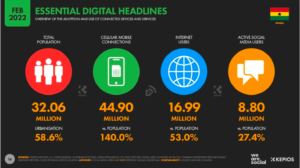The fourth industrial revolution, which is wholly anchored on technological advancement and innovation, opened up vast opportunities in different areas of economies around the world.
Social, economic and commercial lives have seen remarkable developments with the rise of the Internet, technology and digitisation. In Ghana, the pioneering of mobile money in 2009 has been revolutionary in this regard.
The World Bank has recognised Ghana as the fastest growing mobile money market in Africa over the last 5 years. This growing trend of mobile money penetration has been a catalyst for a booming e-commerce industry in the country. The industry has been growing steadily over the past decade and has evolved over time to become the mainstay for many small and medium-scale enterprises (SMEs) in Ghana.

Besides mobile money, several factors have contributed to the emergence of e-commerce in Ghana. Chief among which is the level of internet penetration. According to Kepois – a social media research organisation, Internet penetration in Ghana is among the highest in the West African sub-region. Out of a population of 32.06 million people, 16.99 million (53.0%) are active Internet users, meaning that well over half of Ghanaians are on the Internet at one point or the other.
This is a huge opportunity, and many users have taken advantage of this to either start businesses or expanded their businesses to include online channels. From Instagram to WhatsApp, Snapchat to TikTok; there are millions of Ghanaians – both young and old – using the opportunity to trade in goods and services on these platforms with payments enabled mainly through mobile money and other electronic payment media. Online retail outfits have become a core part of modern Ghanaian lifestyle.
Furthermore, the Ghana Interbank Payment and Settlement Systems (GhIPSS), launched an Internet payment gateway to enable holders of domestic Automated Teller Machine (ATM) cards to make payments and purchases online. Subsequently, the launch of the ‘gh-link Ecommerce’ will promote e-commerce and enhance the services needed in the e-commerce value chain.
The benefits of this new trend of doing business are enormous. Digitisation and e-commerce have unlocked the entrepreneurial spirits of many Ghanaians, making it a major source of employment and revenue generation avenue for them. Many of Ghana’s young population have found stable employment, leveraging the benefits of the Internet, mobile money and apps to unlock new opportunities to connect demand and supply sides of the economy through e-commerce.
E-commerce has also allowed businesses to diversify their offerings and expand their business operations from hitherto fixed operating times to 24/7 operations with increasing productivity and value extraction. Traditional businesses who hitherto used to conduct business physically have expanded their portfolios of services and products in response to evolving consumer demands through e-commerce. Today, banks, insurance companies, restaurants and grocery shops have online options that deliver the same, if not better and with less stress, services to customers and clients.
In terms of public revenue generation, government becomes a beneficiary through the widening of the tax net to capture businesses operating within this segment. The Ghana Revenue Authority (GRA) has announced that it intends to introduce an e-commerce tax in April this year to rake in some GH¢2.4billion. When done effectively, this could possibly have a huge positive impact on domestic tax mobilisation by government to bring us closer to the desired tax to GDP ratio of our peers.
To fully realise the benefits of e-commerce in Ghana, however, government must dialogue with other stakeholders to shape e-commerce and the digital economy by defining the rules that shape and govern the sector. This is a huge challenge that will involve adapting existing policies, laws and regulations to cater for this emerging and growing trend of e-commerce in Ghana.
The writer is the Head – Transactional Products & Services, Stanbic Bank










